英语必修一Unit4单词讲解
高一英语必修一Unit4单词讲义
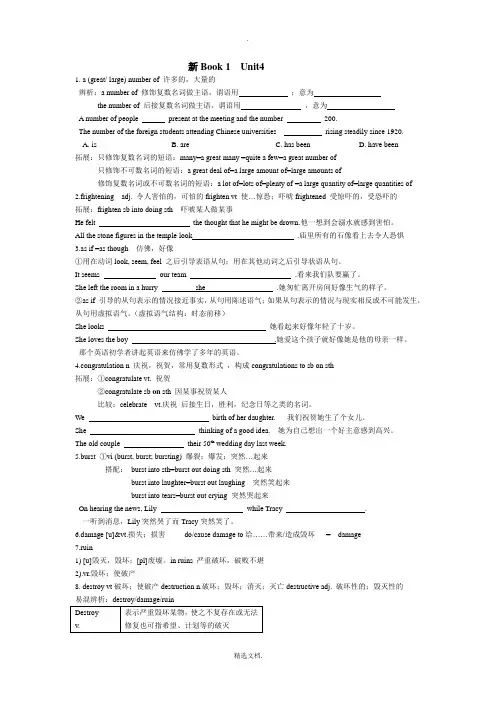
新Book 1 Unit41. a (great/ large) number of 许多的,大量的辨析:a number of 修饰复数名词做主语,谓语用;意为the number of 后接复数名词做主语,谓语用,意为A number of people present at the meeting and the number 200.The number of the foreign students attending Chinese universities rising steadily since 1920.A. isB. areC. has beenD. have been拓展:只修饰复数名词的短语:many=a great many =quite a few=a great number of只修饰不可数名词的短语:a great deal of=a large amount of=large amounts of修饰复数名词或不可数名词的短语:a lot of=lots of=plenty of =a large quantity of=large quantities of 2.frightening adj. 令人害怕的,可怕的frighten vt 使…惊恐;吓唬frightened 受惊吓的,受恐吓的拓展:frighten sb into doing sth 吓唬某人做某事He felt the thought that he might be drown.他一想到会溺水就感到害怕。
All the stone figures in the temple look .庙里所有的石像看上去令人恐惧3.as if =as though 仿佛,好像①用在动词look, seem, feel 之后引导表语从句;用在其他动词之后引导状语从句。
It seems our team .看来我们队要赢了。
高一英语必修一Unit4Earthquakes知识点讲解和练习
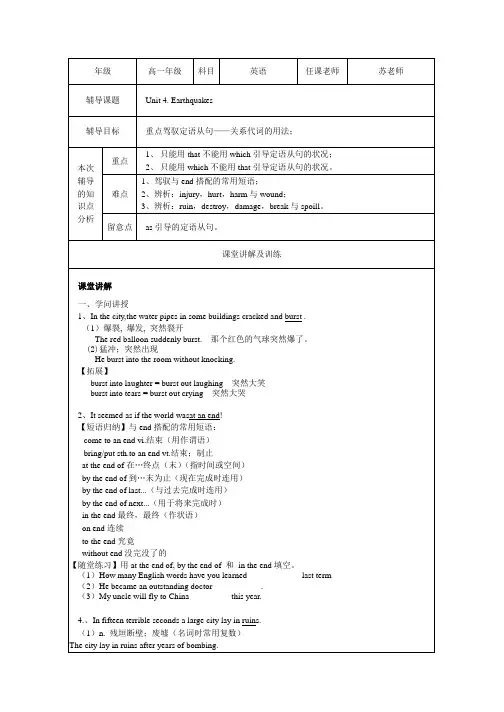
1、关系代词which用来指物,在从句中可作主语或宾语。
This is a book which tells about space rocket technology.(作主语)
The letter which I received yesterday was from my brother.(作宾语)
【归纳总结】
give out分发;发出;用完give sth.away赠送;颁发;泄露
give back归还;复原givein呈上;倒戈,屈服,认输
give off发出,放出give over停止,中止
give up放弃give on to/onto sth.朝向,面对;通向
8、Your speech was heard by a group of fivejueges,all of whom agreed that it was thebest one this year.
易混词
辨析
例句
injury
多指意外事故受伤。比hurt正式,hurt多指伤痛,而injure则指损害健康、成就、容貌等,强调功能的损失。
A bullet injured his lefgt eye.
hurt
既可指肉体上的损害,也可指精神上、感情上的损害;作不及物动词,意为“(身体某部位)难受”。指肉体上的损害时,hurt可与badly,slightly,seriously等连用,但若指精神上的创伤,只能说very much/rather/deeply hurt。
(1)n.裁判员;法官;审判员
His father used to be a judge.他的父亲过去是一名法官。
(2)v.推断;断定
Unit4 单词、短语及句式-高一英语人教版必修一
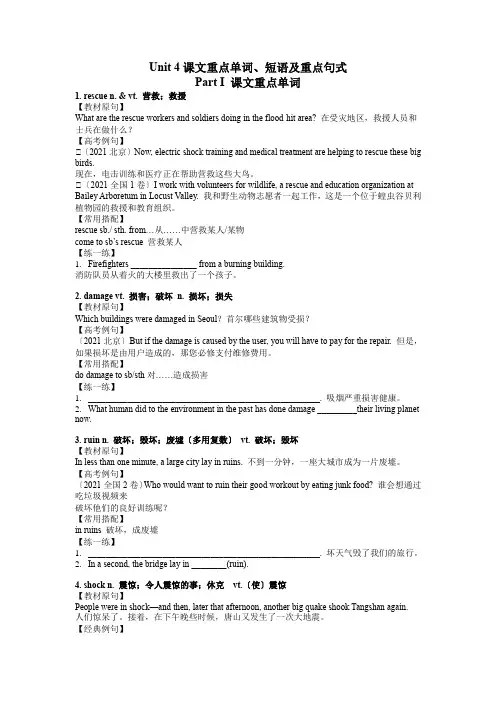
Unit 4课文重点单词、短语及重点句式Part I 课文重点单词1. rescue n. & vt. 营救;救援【教材原句】What are the rescue workers and soldiers doing in the flood-hit area? 在受灾地区,救援人员和士兵在做什么?【高考例句】①〔2021北京〕Now, electric shock training and medical treatment are helping to rescue these big birds.现在,电击训练和医疗正在帮助营救这些大鸟。
①〔2021全国1卷〕I work with volunteers for wildlife, a rescue and education organization at Bailey Arboretum in Locust Valley. 我和野生动物志愿者一起工作,这是一个位于蝗虫谷贝利植物园的救援和教育组织。
【常用搭配】rescue sb./ sth. from…从……中营救某人/某物come to sb’s rescue 营救某人【练一练】1.Firefighters _______________ from a burning building.消防队员从着火的大楼里救出了一个孩子。
2. damage vt. 损害;破坏n. 损坏;损失【教材原句】Which buildings were damaged in Seoul?首尔哪些建筑物受损?【高考例句】〔2021北京〕But if the damage is caused by the user, you will have to pay for the repair. 但是,如果损坏是由用户造成的,那您必修支付维修费用。
【常用搭配】do damage to sb/sth对……造成损害【练一练】1._____________________________________________________. 吸烟严重损害健康。
英语必修一Unit4单词表(配图和特殊记忆法)
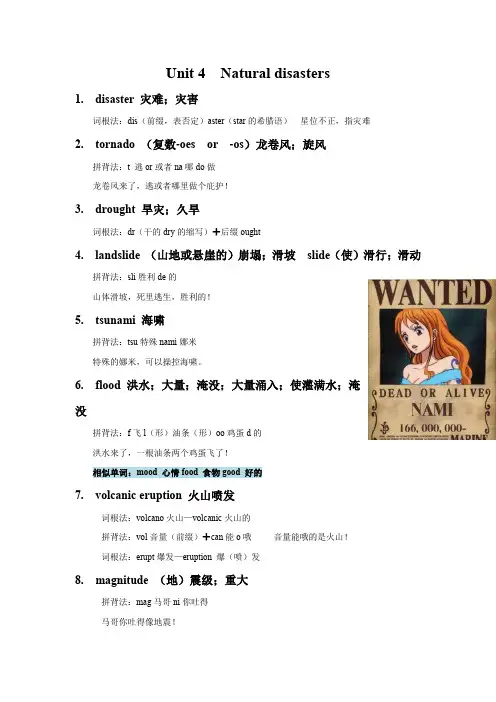
Unit 4 Natural disasters1. disaster 灾难;灾害词根法:dis(前缀,表否定)aster(star的希腊语)➡️星位不正,指灾难2. tornado (复数-oes or -os)龙卷风;旋风拼背法:t 逃or或者na哪do做龙卷风来了,逃或者哪里做个庇护!3. drought 旱灾;久旱词根法:dr(干的dry的缩写)➕后缀ought4. landslide (山地或悬崖的)崩塌;滑坡slide(使)滑行;滑动拼背法:sli胜利de的山体滑坡,死里逃生,胜利的!5. tsunami 海啸拼背法:tsu特殊nami娜米特殊的娜米,可以操控海啸。
6. flood 洪水;大量;淹没;大量涌入;使灌满水;淹没拼背法:f飞l(形)油条(形)oo鸡蛋d的洪水来了,一根油条两个鸡蛋飞了!相似单词:mood 心情food 食物good 好的7. volcanic eruption 火山喷发词根法:volcano火山—volcanic火山的拼背法:vol音量(前缀)➕can能o哦音量能哦的是火山!词根法:erupt爆发—eruption 爆(喷)发8. magnitude (地)震级;重大拼背法:mag马哥ni你吐得马哥你吐得像地震!9. rescue 营救;救援拼背法:re热s死cu醋e鹅热死吃醋的鹅是一种救援。
10. damage 损害;破坏;损坏;损失词根法:dama(征服)➕(a)ge(表行为结果)➡️征服意味着对另一方的破坏词根法2:dam(damn该死的,诋毁的缩写)➕age(名词词根,但语境不同也可表示动词)➡️诋毁会损害他人,但不会完全摧毁拓:与破坏:destroy、ruin的区别destroy:完全摧毁,已没有了当初的模样ruin:也是完全摧毁,但更多表示成为废墟,废墟11. destroy 摧毁;毁灭词根法:de(表相反、否定)➕story(建造的意思)12. evacuate 疏散;撤出;撤离词根法:e(词根ex的简写,向外)➕vac( ️eg.vacation:空出来的日子)➕u引导的形容词后缀“ate”➡️表撤出使变空,即疏散13. helicopter 直升机拼背法:heli(类highly高高地)➕copter(“靠扑腾”,似螺旋桨发出的声音)词根法:helic(螺旋)➕opt(选择)➕er(表机器)➡️选择螺旋上升的机器,即 ️14. death 死;死亡die动词:he died last week。
高一英语必修一_unit4_单词
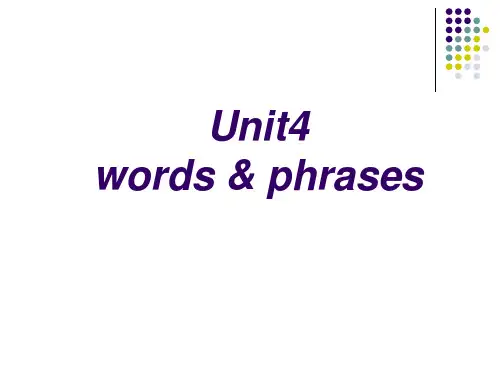
5. nation n. 民族,国家,国民 national adj. 国家的,民族的,国营的 nationality n. 国籍 辨析:nation, country, state
易混词 nation 辨析 例句
侧重指“人民”,即 The whole nation was in deep sorrow. 举国悲痛。 “国民”
1). rescue救助,援救,营救。重在强调迅速行动, 从直接的,迫在眉睫的危险中解救。 eg: A team was sent away to rescue the people trapped in the fire. 一个小队被派去营救 困在火中的人。
2). save救,救助,拯救。为普通用词,常指把处 于危险或危急状态的人或事物解救出来,使之得 以保全。 eg: They had no way to save the situation.
event
侧重大事,要事,体育赛 事 The election was the main event of 1999. 这次选举是 1999年的主要大事。
affair
常用复数affairs表示商 业事务或政府的日常事 务,如财政管理,外交 事务等。
He shows great interest in international affairs.
其他词组: bring/put an end to 使终止 come to an end 结束 end up with 以…而告终
1. The job came to an end last week. 这项工作上周结束了。 2. The emergency put an end to the meeting. 这个紧急情况使会议终止/停止了。 3. At the dinner we usually begin with soup and end up with fruit. 晚餐我们通常以汤开始以水果结束。
高一(上)英语必修一Unit4_Earthquakes重点单词短语归纳整理
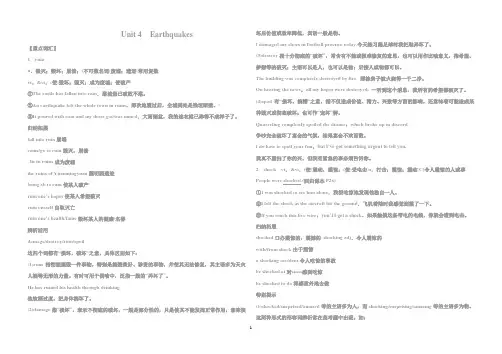
Unit 4 Earthquakes【重点词汇】1 ruinn.毁灭;毁坏;崩溃;(不可数名词)废墟;遗迹(常用复数vt.&vi.(使)毁坏;毁灭;成为废墟;使破产①The castle has fallen into rain.那城堡已破败不堪。
②An earthquake left the whole town in ruins.那次地震过后,全城到处是残垣断壁。
…③It poured with rain and my dress got/was mined.大雨倾盆,我的连衣裙已淋得不成样子了。
归纳拓展fall into ruin崩塌come/go to ruin毁灭,崩溃lie in ruins成为废墟the ruins of Yuanmingyuan圆明园遗迹bring sb.to ruin使某人破产ruin one‟s hopes使某人希望破灭ruin oneself自取灭亡ruin one‟s health/fame毁坏某人的健康/名誉辨析活用damage/destroy/ruin/spoil这四个词都有“损坏,破坏”之意,具体区别如下:(1)ruin指彻底摧毁一件事物,特别是摧毁美好、珍贵的事物,并使其无法修复,其主语多为天灾人祸等无形的力量。
有时可用于借喻中,泛指一般的“弄坏了”。
He has ruined his health through drinking.他饮酒过度,把身体搞坏了。
(2)damage指“损坏”,表示不彻底的破坏,一般是部分性的,只是使其不能发挥正常作用,意味损坏后价值或效率降低,宾语一般是物。
I damaged my shoes in football practice today.今天练习踢足球时我把鞋弄坏了。
(3)destroy指十分彻底的“破坏”,常含有不能或很难修复的意思,也可以用作比喻意义,指希望、梦想等的破灭;主语可以是人,也可以是物;后接人或物都可以。
高中英语2019新教材必修一Unit 4 natural disasters 单词
Book1 Unit 4(英译中)Book1 Unit 4(中译英)disaster n.灾难;灾害tornado 龙卷风;旋风drought n.旱灾;久旱landslide n. ( landfall) 崩塌,滑坡slide vi. & vt. (使)滑行;滑动tsunami n. 海啸flood n.洪vi. vt.淹没,大量涌入volcanic eruption 火山喷发magnitude n. (地)震级;重大rescue n.& vt.营救;救援damage vt.损害,破坏n.损坏,损失destroy vt. 摧毁,毁灭evacuate vt.疏散,撤出vi.撤离helicopter n. 直升机death n. 死;死亡affect vt. 影响;(疾病)侵袭;深深打动shelter n.避难处vt.保护,掩蔽vi.躲避crack n.裂纹;裂缝vi,vt. (使)破裂as if 好像;仿佛ruin n.&vt. 破坏;毁坏in ruins 严重受损;破败不堪percent n. 百分之…adj.&adv.每一百种brick n. 砖;砖块metal n.金属shock n.震惊,令人震惊的事,休克vt.(使)震惊in shock 震惊;吃惊electricity n.电;电能trap vt.使落入险境,使陷入圈套n. 险境陷阱bury vt. 埋葬;安葬breathe vi.& vt.呼吸revive vt.& vi.复活;(使)苏醒revival n.振兴;复苏effort n.努力;unify vi.& vt. 统一;(使)成一体wisdom n.智慧;才智context n.上下文;语境;背景suffer vt.遭受;蒙受vi.受苦volcano n. 火山erupt vi.& vt. (火山)爆发;(岩浆、烟等)喷出supply n.供应,补给vt. 供应;供给typhoon n.台风in the open air 露天;在户外hurricane n . (尤指大西洋的)飓风survive vi.生存,存活vt.幸存,艰难度过power n.电力供应;力量;控制力tap vi.& vt. n.轻敲;轻拍n.水龙头;pipe n.管子;管道whistle vi. vt.吹口哨n. 哨子(声);呼啸声emergency n.突发事件;紧急情况calm adj.镇静的vt.使平静;使镇静aid vi.& vt. n.援助;帮助;kit n.成套工具;成套设备first aid kit 急救箱on hand 现有(尤指帮助)crash vt.& vi.撞击n.撞车;碰撞sweep vt. & vi.打扫;清扫sweep away 消灭;彻底消除wave n.海浪;波浪vi.& vt.挥手;招手strike vi.& vt.侵袭,击打n.罢工;罢课;袭击deliver vt. & vi.递送;传达vt.发表summary n.总结;概括;概要effect n.影响;结果;效果length n.长;长度Unit 4 natural disasters 单词原版带音标disaster / dɪˈzɑ:stə(r) / n.灾难;灾害tornado /tɔ:ˈneɪdəʊ / n.(pl. -oes or -os) 龙卷风;旋风drought / draʊt / n.旱灾;久旱landslide / ˈlændslaɪd / n. ( landfall) (山地或悬崖的)崩塌;滑坡slide / slaɪd / vi. & vt. (使)滑行;滑动tsunami / tsu:ˈnɑ:mi / n. 海啸flood /flʌd / n. 洪水;大量vi.淹没;大量涌入vt.使灌满水;淹没volcanic eruption / vɔlˈkænɪk ɪˈrʌpʃn / 火山喷发magnitude /ˈmægnɪtju:d / n. (地)震级;重大rescue /ˈreskju:/ n.& vt.营救;救援damage /ˈdæmɪdʒ / vt.损害;破坏n.损坏;损失destroy /dɪ'strɔɪ/ vt. 摧毁;毁灭evacuate /ɪˈvækjueɪt / vt.疏散;撤出vi.撤离helicopter /ˈhelɪkɒptə(r)/ n. 直升机death/ deθ/ n. 死;死亡affect /ə'fekt/ vt. 影响;(疾病)侵袭;深深打动shelter /'ʃeltə(r)/ n.避难处;居所;庇护vt.保护;掩蔽vi. 躲避(风、雨或危险)crack /kræk/ n.裂纹;裂缝vi. & vt. (使)破裂as if 似乎;好像;仿佛ruin /'ru:ɪn/ n.&vt. 破坏;毁坏in ruins 严重受损;破败不堪percent / pəˈsent / n. 百分之……adj.&adv.每一百种brick /brɪk/ n. 砖;砖块metal /'metl/ n.金属shock /ʃɒk/ n.震惊;令人震惊的事;休克vt.(使)震惊in shock 震惊;吃惊electricity /ɪˌlekˈtrɪsəti/ n.电;电能trap /træp/ vt.使落入险境;使陷入圈套n. 险境;陷阱bury /ˈberi/ vt. 埋葬;安葬breathe / bri:ð/ vi.& vt.呼吸revive /rɪˈvaɪv/ vt.& vi.复活;(使)苏醒revival /rɪˈvaɪvl/ n.振兴;复苏effort /'efət/ n.努力;艰难的尝试;尽力unify /ˈju:nɪfaɪ / vi.& vt. 统一;(使)成一体wisdom /ˈwɪzdəm/ n.智慧;才智context /ˈkɒntekst/ n.上下文;语境;背景suffer /ˈsʌfə/ vt.遭受;蒙受vi. (因疾病、痛苦、悲伤等)受苦volcano /vɒlˈkeɪnəʊ/ n. (pl. -oes or -os)火山erupt /ɪˈrʌpt/ vi.& vt. (火山)爆发;(岩浆、烟等)喷出supply /səˈplaɪ/ n.供应(量);补给;[pl.] 补给品vt. 供应;供给typhoon /taɪˈfu:n/ n.台风in the open air 露天;在户外hurricane /ˈhʌrɪkən/ n . (尤指大西洋的)飓风survive /səˈvaɪv/ vi.生存;存活vt. 幸存;艰难度过power /ˈpaʊə(r)/ n.电力供应;力量;控制力tap /tæp/ vi.& vt. 轻叩;轻敲;轻拍n.水龙头;轻叩;轻敲pipe /paɪp/ n.管子;管道whistle /ˈwɪsl/ vi.吹口哨;发出笛声vt. 吹口哨n. 哨子(声);呼啸声emergency /iˈmɜ:dʒənsi/ n.突发事件;紧急情况calm /kɑ:m/ adj.镇静的;沉着的vt.使平静;使镇静aid /eɪd/ n.援助;帮助;救援物资vi.& vt. (formal) 帮助;援助kit /kɪt/ n.成套工具;成套设备first aid kit 急救箱on hand现有(尤指帮助)crash /kræʃ/ vt.& vi.碰撞;撞击n.撞车;碰撞sweep /swi:p/ vt. & vi. ( swept, swept) 打扫;清扫sweep away消灭;彻底消除wave /weɪv/ n.海浪;波浪vi.& vt.挥手;招手strike /straɪk/ vi.& vt. (struck, struck/stricken) 侵袭;突击;击打n. 罢工;罢课;袭击deliver /dɪˈlɪvə(r)/ vt. & vi.递送;传达vt.发表summary /ˈsʌməri/ n.总结;概括;概要effect /ɪˈfekt/ n.影响;结果;效果length /leŋθ/ n.长;长度。
新课标高中英语必修一第四单元黑体单词及短语讲解
7. destroy vt. 破坏;毁坏;消灭
① 这场火灾毁坏了整个森林。 The fire destroyed the whole forest. ② 他所有的希望都破灭了。 All his hopes were destroyed. destroyed The storm _________ buildings and crops. (毁灭)
were shocked at We __________________ the news. shocking The news is ___________(shock)
表示情感的动词 excite, surprise, interest, bore, move, shock, disappoint, satisfy, (惊讶,兴趣,乏味,感动, 失望 ,满意) 变为形容词时可加ing(指物)或加ed (指人)
6. injure vt. 损害;伤害
① 他打篮球时膝盖受伤了。 He injured his knee when ( he was) playing basketball. ② 撞车事故中有三人死亡,五人受伤。 Three people were killed and five injured in the crash. injury n. 损害;伤害 injured adj. 受伤的
其他词组:
bring/put an end to 使终止 come to an end 结束 end up with 以….而告终
① The job came to an end last month.
② 她的忽然来到使他们的会议终止了。
Her sudden arrival put an end to their meeting.
2019人教新版高中英语必修一Unit 4 Natural disasters New words
12.bury vt. 埋葬;安葬
13.breathe v. 呼吸;艰难的尝试
15.suffer vt. 遭受;蒙受 Vi.(因疾病、痛苦、悲伤等)受苦
16.supply n.&vt. 供应;供给
17.survive vi. 生存;存活 Vt.幸存;艰难度过
their health
damaged
4.destroy vt.摧毁;毁灭 (destroyed,destroyed) 词形拓展:
destruction was destroyed
destructive being destroyed
5.death n. 死亡
death rate 死亡率
词形拓展:
22.strike v.侵袭;突击;击打 n.罢工;罢课;袭击
23.deliver v. 递送;传达;发表
24.effect n.影响;结果;效果
谢谢
in to
demaged
ruined
destroyed
10.shock n.&v. 震惊
短语归结:
11.trap vt. 使落入险境;使陷入圈套 n.陷阱;险境
(trapped; trapped) He was trapped in the lift. We can set a trap to stop him
6.affect vt. 影响(疾病)侵袭;深深打动
is affected affected
深深打动 影响
侵袭
知识拓展:
7.shelter n.避难处;居所 v.躲避 短语:
8.as if /though 似乎;好像;仿佛
知识拓展:
9.ruin n.&vt. 破坏;毁坏
英语必修一Unit 4 Earthquakes词汇句子解析
英语必修一Unit 4 Earthquakes词汇句子解析Unit 4 Earthquakes词汇讲解是整理的,旨在提供综合运用所需材料,希望能够帮到你!重视衔接,做好过渡高一新学期伊始!Unit 4 EarthquakesWord usage1. shake 1)v. (shook, shaken)to (cause to) move up and down or from side to side with quick short movements. 2) n. [C usually sing.] an act of shakingThe house shook when the earthquake started.Shake the bottle before taking the medicine.He came forward and shook me by the hand. =He came forward and shook hands with me.He was shaking with anger.She answered “no” with a shake of the head.2. rise 1) vi. (rose, risen) to move from a lower to a higher level or position; go up 2) n. [C (in)] an increase in quantity, price, demand etc.The sun has not yet risen.The population of the city has risen to five million.He rose and left the room.There will be a rise in unemployment next year.Theres been a sharp rise in the cost of living.2. pond n. an area of still water smaller than a lake, especially one that has been artificially madeSome cattle were drinking at the pond.There are some fish living in the pond.When an earthquake is coming, fish will jump out of ponds.3. burst 1) v. to (cause to ) break open or break apart suddenly and violently, usually as a result of pressure from within and often cause the contents to become widely scattered.2) n. an act of result of bursting; (of) a sudden short period of great activity, loud noise, strong feeling; outbreakThe balloon burst.After ten days of rain the river burst its banks.A burst of hand-clapping followed the ending of the song.4. canal n. an artificial stretch of water dug in the ground to allow ships or boats to travel alongit, or to bring water to or remove water from an areaCoal used to be sent here by canal.Canals have been built to irrigate the desert.The Panama Canal joins two oceans.5. steam n. [U] 1) water in the state gas produced by boiling2) power or effort produced by steam under pressure, and used for making things work or moveWho invented the steam engine?Steam was used to be the power of a train.There is steam bursting from that hole.6. ruin 1. n. a) [U] the cause or state of destruction and decayb) [C] a building that has been badly damaged or destroyed2. vt. a) to spoil or completely destroy a person or thingb) to cause someone to loss all their moneyThe temple has fallen into ruin.We visited the ruins of the temple.The heavy rain ruined our holiday.The hurricane ruined all the houses here.The flood ruined the crops.If I lose my lawsuit(官司), the cost will ruin me.7. injure vt. to cause physical harm to (a person or animal), especially in an accident; hurt seriously; to damageI hope I didnt injure her feelings.His back was injured.Two people were killed and seven were injured.His reputation will be badly injured by the vicious rumour.8. destroy vt. to damage sth so severely that it can not be repaired; put an end to the existence of; ruinA fire destroyed the house.What he said destroyed our last hope.All hopes of peaceful settlement were destroyed by his speech.9. brick n. [C,U] 1) a hard piece of baked clay used for building2) sth. in the shape of a brickThey used yellow bricks to build the house.The tower is made of bricks.Bricks covered the ground like red autumn leaves.10. useless adj. not of any useThis knife is so blunt. Its useless.I realized it was useless to reason with him.I was useless at maths. = My maths is very poor.11. shock 1) n. a) [C, U] a violent force from sth such as explosion,a crash or a hard blowb) [C, U] the feeling you get after sth unexpected and usually very unpleasant has suddenly happened, or you have received an unexpected piece of newsc) the poor medical condition of someone who has an accident and whose heart and lungs are not working properly2) v. to make someone feel very upset, angry, or unpleasantEarthquake shocks are often felt in Japan.The news of his death was a shock to us.The traffic accident sent him into a state of shock.They were shocked by her rudeness.We were shocked by his sudden death.12. rescue v. to save someone or sth from harm or dangerHe rescued three children from the burning building.The life boat was sent out to rescue the sailors from the sinking ship.The boy was rescued after hours at sea.13. disaster n. [C,U] a sudden event causes great loss or harmWe were all shocked by the disaster.The earthquake is one of the worst natural disasters the country has ever suffered. People began to wonder how long the disaster would last.14. organize v. to plan and arrange an event; to arrange things ina sensible orderWell organize an oral English contest.The story is very well organized.They organized the truckers into a union.15. shelter 1) n. a) [U] protection, especially from bad weather or danger b) a building that protects you from weather or danger.2) vt. to protect someone or sth from bad weather or danger;vi. to stay in a place in order to be protected from bad weather or dangerThe umbrella is a poor shelter from heavy rain.Their immediate need is for food, clothing and shelter.The wall sheltered us from the wind.She was accused of sheltering a murderer.She wad sheltered by the USA.In the rain people were sheltering in the doorways of shops.16. fresh adj. 1) new and different (only before a noun ); 2) recently picked, caught, produced and therefore in good condition (used of food);3) clean, cool and pleasantThey buy fresh meat.This kind of fish lives in fresh water.She is fresh from university.She is quite fresh to office work.17. percent n. parts for each 100The bank has increased its interest rate by one percent.Over ninety percent of the islanders here are illiterate.He spends a large percent of his income on food and drink.18. speech n. 1) [C] a formal talk to a group of listeners2) [U] the ability to speak or the act of speaking3) [U] way of speakingThe chairman made an opening speech.She is researching speech development in children.We express our thoughts by speech.By your speech I can tell youre from Hong Kong.19. judge 1) vi. vt. to decide who or what is the winner in a competition2) [vt. + that] to form or give an opinion about someone or sth after careful thoughtjudging from, judging by…3) n. a public official who has the power to decide questions brought before a court of law; a person who has the knowledge and experience to give an opinion about the value of sthYou cant judge a book by its cover.He is going to judge the first race.We must judge whether he is guilty.The prisoner was taken before the judge.He was one of the judges at the horse race.20. honour 1) n. a) [U] great respect and admirationb) [sing] sth that brings great respect and pride2) v. to show respect to sb. or to praise sb. publiclyWe fight for the honor of our country.He is an honor to our school.Children should be taught to show honor to their elders.He honors his teachers.20. prepare 1) vt. to make sth. ready for a future event or action 2) vi. to get ready to do sth.They prepared themselves for the worst.When we arrived home, mother had already prepared dinner for us.I was preparing for bed when I heard a knock at the door.Useful expressions1. right awayat once ; in no time; immediatelyI will return the book right away.I am getting in touch with him right away.We are about to start right away.2. end1) at an endfinish; overIt seems that the world was at en end.2) bring… to an end =put an end to…I wonder how I can bring the dispute to an end.=I wonder how I can put an end to the dispute.3) come to an endThe meeting came to an end at midnight.4) at the end of…At the end of the road there is a shop.5) by the end of…How many English words have you learned by the end of last term?6) in the end =at last; finallyHe will be a scientist in the end.3. dig out1) to get sth out of a place, using a spade or your hands2) to find sth you have not seen for a long time, or that is not easy to findLets dig out the roots.Why did you dig out all those old magazines?We must dig the truth out of him.1. a (good \ great \ large) number of+ n.(pl.)many; a large quantity of; a lot ofA good number of students are not interested in modern art.Ive seen the film a number of times.The Great Wall attracts a great number of foreign tourists every day.the number of…The number of private colleges has increased.= Private colleges have increased in number.5.give out1) to give sth to a number of different people, especially to give information to people2) to produce light, heat, a sound, a gas, smell etcYou have no right to give my telephone number out.Students were giving out leaflets(传单)to everyone on the street.The teacher gave out the examination papers.The radiator (散热器) is giving out a lot of heat.与give有关的常用短语还有:give away 送掉,捐赠give in 让步,屈服give off 发出(气味、光、热、声音等),此时相当于give outgive up放弃give back 归还6.thousands of基数词+s,并不表示确切的具体数字,可以单独使用,也可以先接介词of 再接复数名词。
- 1、下载文档前请自行甄别文档内容的完整性,平台不提供额外的编辑、内容补充、找答案等附加服务。
- 2、"仅部分预览"的文档,不可在线预览部分如存在完整性等问题,可反馈申请退款(可完整预览的文档不适用该条件!)。
- 3、如文档侵犯您的权益,请联系客服反馈,我们会尽快为您处理(人工客服工作时间:9:00-18:30)。
He’s a head of state. 他是一位国家元首。
• • • • • •
ruin (1) n. [U] 毁坏;毁灭;灭亡 Eg: The war brought ruin to the country. (2) n. 倒塌的建筑物,废墟 Eg: The castle now lies in ruins. 注意:ruin表示“废墟,遗迹”,常用复数, 常构成in ruins,意为“严重受损,破败不 堪”,强调状态,常用作表语或状语。 • (3)v. (完全地)毁坏,毁掉;使破产 • Eg: I was ruined by that law case.
• • • •
electricity n. [U] 电,电力 Eg: This machine is run/driven by electricity. 拓展: turn on/off electricity 接通/切断电源 electric adj. 用电的,电动的 electrical adj. 电的,与电有关的 electronic adj.电子的
• shock • (1)v. 使震惊;使惊愕;使难以置信 • 搭配: be shocked at 对……感到震惊 • be shocked to do sth 惧怕做某事 eg: The murder of such a young child deeply shocked the whole community. (2)v. (使)愤慨,(使)生气 eg: Just ignore all their bad language ─ they only do it to shock. (3) n. 令人震惊的(情况,消息) 搭配:be a shock to sb 对某人来说是一个打击 eg: It was a real shock to hear that the factory would have to close.
greed + -y = greedy贪婪的
taste+ -y = tasty 美味的 fat + -y = fatty 肥胖的 fog + -y = foggy 有雾的
• burst • ①v.(使)爆裂;(使)破裂;(使)爆炸 • Eg: You are going to burst the balloon if you are not careful. • The balloon suddenly burst. • ②v.猛冲;突然出现 • Eg: He burst into the room without knocking. • burst into+ n.=burst out doing sth. 突然…… 起来 eg: burst into laughter=burst out laughing
• shocked adj. 惊愕的,感到震惊的 shocking adj. 令人震惊的 rescue (1) n. [C,U] 救援,营救;救援行动 eg: The rescue team made ten rescues in a week. (2) vt. 救援,拯救,解救 搭配:rescue sb/sth from 把……从……(地 方)解救出来 eg: They rescued the boy from the burning house.
• extreme • (1)adj. 极度(大)的;严重的;极端的; 过分的 • Eg: extreme weather conditions 极端恶劣的 天气情况 • extreme sports 极限运动 • (2) n. [C] 完全相反的事物;极端,极度, 极限 • Eg: extremes of cold, wind or rain 严寒,狂风, 骤雨 • 拓展: go to extremes 走极端
1). at an end: 表示“终结,结束”,与be动词连用。 eg: 战争结束了。
The war was at an end.= The war came to an end.
2). in the end: 表示“最终,终于”,单独使用作状语。 eg: 最终他们放弃了那项计划。 They gave up the plan in the end. (at last) 3). at the end of: 表示“在…的尽头/末尾” eg: 今年年底,我父亲要回家。 My father will come home at the end of this year. He is at the end of his patience.
eg: 她突然笑起来。
She burst out laughing.
She burst into laughter .
他突然大哭起来。
He burst out crying. 闯入 充满
He burst into tears.
n. 突然爆裂,爆发 短语:a burst of… 一阵…
burst into burst with
injure
指损害健康,成就,容 A bullet injured his left eye. 貌等,强调功能的丧失, 一颗子弹伤了他的左眼。 常指事故中的伤害 普通用语,既可指肉体 上的伤害,也可指精神 上,感情上的伤害 I don’t want to hurt you. 我不想伤害你。 The soldier was wounded badly. 这位士兵严重受伤。
• 拓展: • be in ruins 呈一片废墟 bring sth to ruin 使某物毁灭 bring sb to ruin 使某人破产 suffering n. [U] 疼痛,痛苦,折磨,苦难 eg: Death finally brought an end to her suffering. 注意:sufferings 表示“痛苦,苦恼” eg: The hospital aims to ease the sufferings of the dying.
• a rescue team 救援队 rescue worker 救援人员
trap (1) vt. (trapped)困住,关住,使陷入危 险中 搭配:be trapped in 困在……中 eg: The car was trapped in the deep snow. (2) n. [C]陷阱;困境;圈套,诡计 eg: She had set a trap for him and he had walked straight into it.
• • • • • • •
well ① n. 井 Eg: A book is a well of knowledge. ② adj. 健康的 Eg: I hope you will get well soon. ③ adv. 熟练地,有效地 Eg: He plays the piano very well for his age.
ship for two years.
到下学期末为止,我将学会3000多个英语单词。
I will have learned more than 3000 English words by the end of next term.
5. nation n. 民族,国家,国民 单词积累:national adj. 国家的,民族的,国营的 nationality n. 国籍 辨析:nation, country, state 易混词 辨析 例句 nation
他已经忍耐到极限了。
4). by the end of: 到…末为止,常与完成时态连用。 by the end of last…用于过去完成时
by the end of next…用于将来完成时
eg: 到上个月末为止,他在那条船上已经待了两年。
By the end of last month, he had been on that
4. at an end 结束,终结 eg: 炎热的天气终于结束了。
The hot days are at last at an end.
The hot days come to an end at last. be at an end = come to an end 结束 短语:put an end to…=bring…to an end 使…结束 eg: 他们应该结束战争。 …… They should put an end to the war. They should bring the war to an end. …… 辨析:at an end, in the end, at the end of, by the end of
• • • • • •
smelly adj. 有臭味的,发臭的 Eg: His socks are smelly. 拓展: blood ─ bloody cloud ─ cloudy rain ─ rainy greed ─ greedy 词根:smell 可用作系动词或实义动词,用 作系动词时,意为“闻起来”;用作实义 动词时意为“闻” • Eg: You may smell the mixture and it smells terrible.
eg: 一阵笑声 a burst of laughter 勃然大怒 a burst of anger
• event n. • (1) [C](尤指涉及几个人的)事件,大 事 • Eg: That was an important historical event. • (2)[C](体育比赛等的)项目,赛事 • Eg: The Olympic Games are important events in the sports world.
blood + -y = bloody 流血的 rain + -y = rainy 下雨的
cloud + -y = cloudy 多云的 wind + -y = windy 多风的
